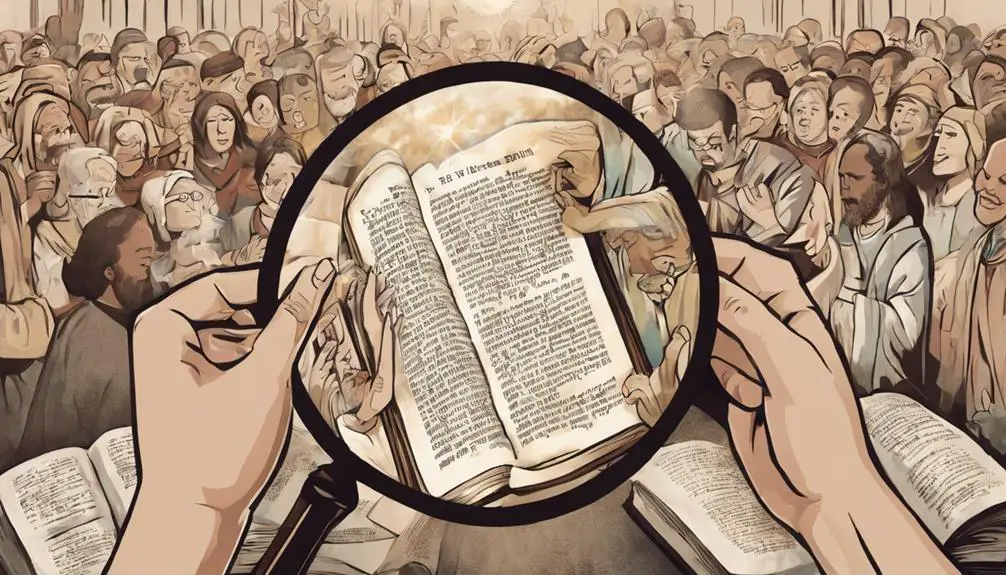Wrestle with the profound themes of reconciliation and unity in our exploration of Ephesians 2:11-22 – what insights await your discovery?

Ephesians 2 11-22 Bible Study Questions
Imagine you've just fired up your stone tablet and chisel, ready to dissect Ephesians 2:11-22. You're poised to explore the rich tapestry of reconciliation and unity that's woven throughout this passage.
But to truly appreciate the depth and complexity of the Apostle Paul's words, you've got to dig deeper, peeling back the layers of historical context and theological implications.
So, how do these verses resonate with you today? What fresh insights can they offer about our shared humanity and spiritual connectedness?
Let's embark on this journey together and see where the text leads us.
Key Takeaways
- Ephesians 2:11-22 emphasizes the importance of unity and peace among believers, regardless of their background or ethnicity.
- The passage highlights the transformation of Gentiles from strangers to members of God's family, through Christ's sacrifice.
- The text underscores that both Jews and Gentiles have equal and direct access to God through Christ, erasing previous divisions.
- The Ephesian church is metaphorically described as a sacred building with Christ as the cornerstone, symbolizing unity and inclusivity.
Understanding Context in Ephesians 2:11-22

To fully grasp the profound message of Ephesians 2:11-22, it's essential to delve into the historical and cultural context that underlies Paul's words. As you may know, Paul penned this letter while imprisoned in Rome, intending to enlighten the Ephesians about their new identity in Christ. The Ephesian church, largely composed of Gentiles, faced challenges in understanding and accepting their status as equal heirs with Jewish believers.
During that period, the Jews and Gentiles were sharply divided, with Jews considering themselves superior due to their Abrahamic lineage. In this divisive climate, Paul's message of unity in Christ was revolutionary.
Ephesians 2:11-22 is a stark reminder of this division. Paul refers to Gentiles as those 'without Christ, being aliens from the commonwealth of Israel, and strangers from the covenants of promise'. This undoubtedly reflects the estrangement the Gentiles must have felt. However, Paul reassures them that through Christ, they're no longer 'foreigners and strangers, but fellow citizens with God's people and also members of his household'. This was a radical departure from prevailing norms, offering hope to the Gentiles and a new perspective on God's inclusive love.
Exploring Key Themes in Ephesians 2:11-22

Having unpacked the historical context of Ephesians 2:11-22, let's now turn our focus to the key themes that emerge from this passage, which shed light on Paul's central message of unity and reconciliation in Christ.
Foremost, we encounter the theme of transformation: from being 'strangers' and 'foreigners' to becoming 'members of the household of God.' This reflects a profound shift in identity for the Gentiles, achieved through Christ's sacrifice.
The second theme is peace, underpinned by the notion that Christ has broken down the 'dividing wall of hostility,' illustrating how reconciliation is possible despite deep-seated divisions.
A third theme is unity, which underlies the entire passage. Here, Paul emphasizes that both Jews and Gentiles are one in Christ. This unity isn't just spiritual but also physical, symbolized by the idea of a new temple where God dwells.
Lastly, we find the theme of access: through Christ, everyone has direct access to God, demolishing the traditional hierarchical structures.
These themes collectively highlight the transformative power of Christ, underscoring the radical inclusivity and equality that mark the Christian faith. Understanding them deepens our appreciation of Paul's message in Ephesians 2:11-22.
Diving Deeper: Verse-by-Verse Analysis

Let's delve into a verse-by-verse analysis of Ephesians 2:11-22, unearthing the depth and nuances embedded in Paul's teachings. Verses 11-13 set the stage by reminding Ephesians of their former alienation from Christ, highlighting their transformation through His sacrifice. They were once strangers to God's covenants, but are now brought near by Christ's blood.
In verses 14-16, Paul uses the metaphor of Christ breaking down the wall of hostility, signifying the end of religious and ethnic tensions between Jews and Gentiles. This reconciliation is achieved through Christ's crucifixion, which abolishes the law's commandments and ordinances. He creates in Himself one new humanity, promoting peace and unity.
Verses 17-18 convey the idea that both Jews and Gentiles have access to the Father through the Spirit because of Christ's work. Verse 19 emphasizes the shift in identity from strangers to fellow citizens with the saints and members of God's household.
Lastly, verses 20-22 depict the church as a building, with Christ as the cornerstone. Each believer, Jew or Gentile, is part of this structure. This analogy underscores the unity and interconnectedness among believers, all rooted and built up in Christ.
Personal Application of Ephesians 2:11-22

Understanding and applying Ephesians 2:11-22 to your own life can profoundly reshape your perspective on unity, peace, and your identity in Christ. It's important to grasp that these verses emphasize how we, as followers of Christ, are no longer strangers or outsiders, but members of God's family. You're part of a collective, a sacred entity that transcends physical and societal boundaries.
The personal application here is multifaceted. Firstly, you're called to remember your past, not to wallow in it, but to acknowledge God's grace that has brought you into His family (v. 11-13). Secondly, you're reminded that Christ is your peace, the One who's brought unity amidst diversity, breaking down the 'dividing wall of hostility' (v. 14-16). This means you must strive for peace and unity in your spheres of influence, reflecting the reconciliation brought by Christ.
Lastly, the truth that you're a dwelling place for God (v. 22) should humbly transform how you view yourself and interact with others. You carry the presence of God, a reality that should inspire reverence, purity, and love in your life. Embrace these truths, and let them guide your daily walk.
Reflections and Insights From Ephesians 2:11-22

Delving into Ephesians 2:11-22, you'll uncover several profound insights that shed light on the nature of unity, reconciliation, and our spiritual identity in Christ. You'll discover that Paul's message not only underscores the reconciliation between Jews and Gentiles but also highlights the all-encompassing peace brought about by Christ's sacrifice.
In verses 11-13, you're reminded of your past state of spiritual alienation. However, in Christ, you're brought near and included in the family of God. The distinction between Jews and Gentiles, akin to cultural or racial divides today, is erased in Christ Jesus, emphasizing the unity and inclusivity of the Gospel message.
Verses 14-18 further elucidate Christ's role as our peacemaker, breaking down the 'dividing wall of hostility'. It's Christ's sacrifice that reconciles us to God and to each other, establishing a new humanity in Him.
Conclusion
In wrapping up, you've delved into Ephesians 2:11-22, uncovering its historical context, key themes, and personal applications.
You've dissected each verse, extracting profound insights and reflections.
This study has shown you how Christ's work reconciles and unites us, breaking down walls of division.
Continue to reflect on these truths and let them shape your understanding of unity in Christ.



Sign up